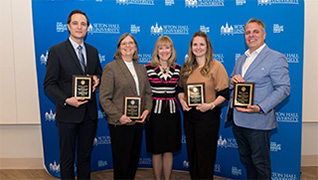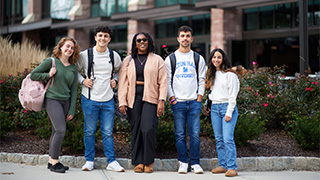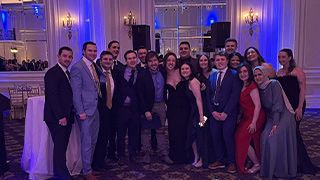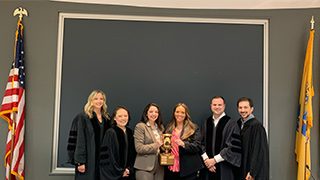Impressive Health Law Faculty at Seton Hall Law
Friday, December 8, 2023
 The Center for Health & Pharmaceutical Law’s dynamic and highly-regarded faculty research, write and present on the leading
health law issues including technology addiction, leadership during crisis, medical
misinformation, cost-effective analysis in medication coverage, impact of COVID on
undocumented individuals, the legal treatment of the use of pre-exposure prophylaxis,
disability law, third-party accommodations, conflicts of interests in doctor-patient
relationships, illegal activities and criminality of pharmaceutical and medical device
companies, violation of federal Medicare and Medicaid rules with overlapping surgeries,
DOJ’s FCA resolutions and enforcements, community health workers, and improving healthcare
access to vulnerable populations to list a few. Their recent accomplishments follow
as awarded the Helen Henry Excellence in Interprofessional Care Award.
The Center for Health & Pharmaceutical Law’s dynamic and highly-regarded faculty research, write and present on the leading
health law issues including technology addiction, leadership during crisis, medical
misinformation, cost-effective analysis in medication coverage, impact of COVID on
undocumented individuals, the legal treatment of the use of pre-exposure prophylaxis,
disability law, third-party accommodations, conflicts of interests in doctor-patient
relationships, illegal activities and criminality of pharmaceutical and medical device
companies, violation of federal Medicare and Medicaid rules with overlapping surgeries,
DOJ’s FCA resolutions and enforcements, community health workers, and improving healthcare
access to vulnerable populations to list a few. Their recent accomplishments follow
as awarded the Helen Henry Excellence in Interprofessional Care Award.
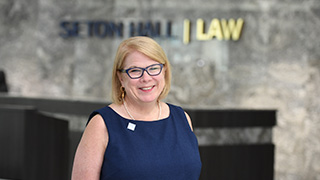 Professor Kathleen Boozang is currently visiting at UC Law San Francisco where she is teaching Providers, Patients
and the Law and the Capstone Seminar as part of its Health Law concentration. Professor
Boozang returns to Seton Hall Law in Spring 2024 and will be teaching two health law
seminars. She recently presented "NIL Necessitates Shared Medical Decision-Making
for College Athletes" at the UCSF/UC Law SF Consortium on Law, Science & Health Policy
on October 19, 2023.
Professor Kathleen Boozang is currently visiting at UC Law San Francisco where she is teaching Providers, Patients
and the Law and the Capstone Seminar as part of its Health Law concentration. Professor
Boozang returns to Seton Hall Law in Spring 2024 and will be teaching two health law
seminars. She recently presented "NIL Necessitates Shared Medical Decision-Making
for College Athletes" at the UCSF/UC Law SF Consortium on Law, Science & Health Policy
on October 19, 2023.
In addition, she has been collaborating with the New England Consortium on Sickle Cell Disease to strengthen its member institutions’ collaboration in working to improve the research around and care provided to individuals living with Sickle Cell Disease.
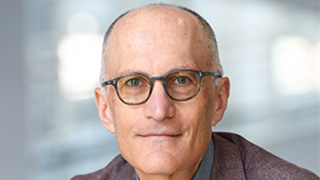 Professor Carl Coleman's most recent article, with Richard J. Baron, M.D., "Protecting the Legitimacy of
Medical Expertise," New England Journal of Medicine 388, 676-678 (2023), criticizes recent legislative efforts to limit the powers of licensing
boards, describing them as "the latest example of a larger movement to undermine the
concept of expertise and the institutions that validate it."
Professor Carl Coleman's most recent article, with Richard J. Baron, M.D., "Protecting the Legitimacy of
Medical Expertise," New England Journal of Medicine 388, 676-678 (2023), criticizes recent legislative efforts to limit the powers of licensing
boards, describing them as "the latest example of a larger movement to undermine the
concept of expertise and the institutions that validate it."
In his forthcoming article, "Jacobson in the Time of Covid: Changing Views of Judicial Deference to Public Health Interventions," Amerika Ho (Japanese American Society for Legal Studies) (forthcoming 2023), Professor Coleman argues that, while the Supreme Court’s 1905 decision in Jacobson v. Massachusetts remains good law, its relevance has been undermined by the increasing importance of federal public health laws, combined with courts’ unwillingness to defer to broad interpretation of federal agencies’ scope of authority.
Professor Coleman was the lead author of a new World Health Organization document, WHO tool for benchmarking ethics oversight of health-related research involving human participants (Geneva: World Health Organization 2023). The document was developed in consultation with an international expert advisory group and was pilot tested in workshops in Kenya, Nigeria, Nepal, India, Egypt, and Pakistan.
Professor Coleman’s presentations included "Measuring the Effectiveness of Research Ethics Committee: WHO’s New Global Benchmarking Tool," The Consortium to Advance Effective Research Ethics Oversight (October 2023); "Vaccine Misinformation and the First Amendment," George Washington University Law School (September 2023); "Jacobson in the Time of Covid: Changing Views of Judicial Deference to Public Health Interventions," Seikei University, Tokyo (June 2023); "Legal Responses to Physician Misinformation," Rikkyo University, Tokyo (June 2023); "Conscripting Physicians During Public Health Emergencies," Tokyo Area Law and Medicine Working Group (June 2023); "Involuntary Commitment as a Form of Medical Treatment: Proceed with Caution," ASLME Health Law Professors Conference (June 2023); "Medical Misinformation and the First Amendment," American Board of Internal Medicine Internal Medicine Summit (May 2023); and "Professional Regulation of Medical Misinformation," Northeastern University Law School (April 2023).
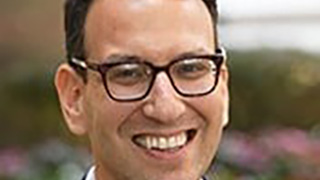 Professor Doron Dorfman's latest work dealt with the relationships between patients and providers after the
Covid emergency declaration ended. In "Approving Workplace Accommodations for Patients
with Long Covid — Advice for Clinicians" published in the New England Journal Of Medicine, Dorfman and John Hopkins’ Zackary Berger, advise medical professionals faces how
to provide specific diagnosis for long Covid to ensure patients receive disability
accommodations at the workplace. This piece seats at the intersection of multiple
areas of expertise for Professor Dorfman: health law, employment law, and disability
law. In another piece published in JAMA Health Forum, "Physicians’ Refusal to Wear Masks to Protect Vulnerable Patients — An Ethical Dilemma"
for the Medical Profession, Dorfman and colleagues deal with another worrisome phenomenon:
situations where providers and staff refuse to wear mask to protect immunocompromised
patients who come to see them and offer solutions to deal with this issue on a structural
level.
Professor Doron Dorfman's latest work dealt with the relationships between patients and providers after the
Covid emergency declaration ended. In "Approving Workplace Accommodations for Patients
with Long Covid — Advice for Clinicians" published in the New England Journal Of Medicine, Dorfman and John Hopkins’ Zackary Berger, advise medical professionals faces how
to provide specific diagnosis for long Covid to ensure patients receive disability
accommodations at the workplace. This piece seats at the intersection of multiple
areas of expertise for Professor Dorfman: health law, employment law, and disability
law. In another piece published in JAMA Health Forum, "Physicians’ Refusal to Wear Masks to Protect Vulnerable Patients — An Ethical Dilemma"
for the Medical Profession, Dorfman and colleagues deal with another worrisome phenomenon:
situations where providers and staff refuse to wear mask to protect immunocompromised
patients who come to see them and offer solutions to deal with this issue on a structural
level.
In November 2023, Professor Dorfman was invited to present this work at the Center for Human Ethics and Values (COMPAS) Colloquium: "Is COVID Over? For Whom? Who Decides?" at The Ohio State University alongside UCLA Law’s Lindsay Wiley and Ohio State Law’s Ruqaiijah Yearby.
Dorfman’s article, "Penalizing Prevention: The Paradoxical Legal Treatment of Preventive Medicine," is set to be published in The Cornell Law Review in January 2024. In this article, Dorfman creates a taxonomy of preventive measures and explores the ways such measures’ social and legal legitimacy differs according to a set of factors. In October 2023, Dorfman was invited to workshop this paper at the Health Law and Policy Colloquium at UCLA Law.
Professor Dorfman’s current work-in progress, "Third-Party Accommodations," aims to reconceptualize the reasonable accommodations doctrine beyond the privity of two parties. The project examines under what circumstances an employer or a public service provider could ask colleagues, classmates, or patrons to alter their behaviors to accommodate an individual with disabilities. Dorfman recently presented "Third-Party Accommodations at the 18th Annual Colloquium on Scholarship in Employment & Labor Law" (COSELL) at the University of Minnesota Law School. On that occasion, he received the Michael J. Zimmer Memorial Award for a rising scholar who has made a significant contribution to the field of work law.
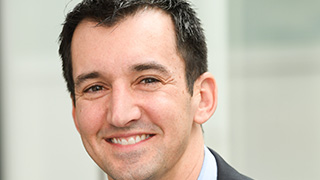 Jacob Elberg In April 2023, the Student Bar Association honored Professor Elberg as Seton Hall’s
Professor of the Year (Paula Franzese Excellence in Teaching Award).
Jacob Elberg In April 2023, the Student Bar Association honored Professor Elberg as Seton Hall’s
Professor of the Year (Paula Franzese Excellence in Teaching Award).
In "Patient-Assistance Programs, Kickback, and the Courts," New England Journal Of Medicine (with Adashi, E.Y. and Cohen, I.G.) (2023), Professor Elberg and his co-authors analyzed recent challenges by pharmaceutical manufacturers to enforcement under the Anti-Kickback Statute of patient-assistance programs, concluding continued enforcement is necessary to maintain public awareness of high drug prices.
In his forthcoming article, "Ain’t No Sunshine: Bringing Physician Conflicts Out of the Dark," University Of Richmond Law Review, Professor Elberg analyzes the Sunshine Act and ties it deficiencies to its failure to focus on the centrality of trust in the doctor-patient relationship. As the Sunshine Act approaches 10 years of operation and state dissatisfaction with the law’s failures prompts a new wave of legislation, Professor Elberg points to recent federal prosecutions of dozens of doctors as providing a roadmap for a patient-centered way to more effectively inform patients of physician conflicts. Professor Elberg had presented the topic at the American Society of Law, Medicine & Ethics Health Law Professors Conference and as a Zaremski Lecture at Case Western Reserve University School of Law.
Professor Elberg provided coverage for SCOTUSblog of the litigation, argument, and ultimate decisions surrounding two recent Supreme Court cases impacting the False Claims Act — the primary mechanism for government enforcement of health care fraud: "United States, ex rel. Polansky v. Executive Health Resources, Inc. and United States, ex rel. Schutte v. SuperValu, Inc."
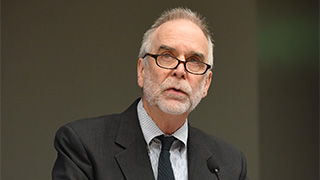 Professor John Jacobi is a member of the NJ Supreme Court Mental Health Advisory Committee addressing diversion
from justice involvement. He serves as Board Vice-Chair of the Greater Newark Health
Care Coalition and Board Chair of the North Jersey Community Research Initiative.
He is advising the NJ Department of Health on the implementation of regulatory and
payment mechanisms for Community Health Workers in New Jersey.
Professor John Jacobi is a member of the NJ Supreme Court Mental Health Advisory Committee addressing diversion
from justice involvement. He serves as Board Vice-Chair of the Greater Newark Health
Care Coalition and Board Chair of the North Jersey Community Research Initiative.
He is advising the NJ Department of Health on the implementation of regulatory and
payment mechanisms for Community Health Workers in New Jersey.
He was appointed to a gubernatorial commission on Health Care Affordability and Transparency. He serves on advisory bodies guiding the implementation of New Jersey Medicaid’s housing initiatives through its §1115 Waiver program, the development of an open-source community services library for service providers assisting underserved populations, and the sustainability of practice transformation efforts integrating behavioral and primary care for new mothers and their newborns. He participates in ongoing projects investigating equitable practices in telehealth, transition services for young adults with intellectual and developmental disabilities, and the development of services for persons "boarding" in acute care hospitals for want of appropriate and appropriately funded step-down facilities.
In June, Professor Jacobi presented "Community Health Workers and Health Equity" at the American Society of Law, Medicine, and Ethics Health Law Professors’ Conference in Phoenix, Arizona. In February he spoke at grand rounds at New Jersey Medical School, Department of Public Health and Preventive Medicine on Public Health Law for Physicians. In October, he presented "Community Health Workers and the Dilemma of Integrated Care" at the University of Houston Law School’s Symposium Workshop, States as Health Policy Laboratories. The paper will be published in a symposium issue of the Houston Journal of Health Law and Policy. On October 25, Professor Jacobi was a panelist in a program at New York University Law School on HIV Discrimination — Past and Present.
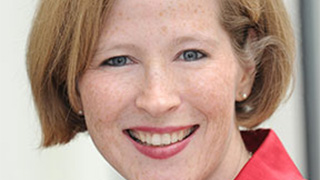 Professor Tara Ragone continues to engage in a range of legal, regulatory, and policy work focused on improving
access to meaningful, evidence-based, whole-person health care. As co-chair along
with Professor Jacobi of the Sustainability and Employment Committee of the New Jersey
Department of Health’s Colette Lamothe-Galette Community Health Worker Institute,
she works closely with state entities and other partners to develop innovative regulatory
and financing proposals to support the training and deployment of CHWs as critical
members of care delivery teams for vulnerable populations. She also is working to
build sustainability for preventive pediatric behavioral health models that offer
an evidence based means of addressing the increasingly alarming pediatric behavioral
health crisis. Professor Ragone is engaged in a number of research projects supported
by the New Jersey Legislature, including consideration of the impact of telehealth
on health equity and mechanisms to improve transitions for young adults with intellectual
and developmental disabilities. She remains steadfastly committed to her multi-year
project with Professor Jacobi to eliminate legal, regulatory, and reimbursement barriers
to integrated outpatient primary and behavioral health care.
Professor Tara Ragone continues to engage in a range of legal, regulatory, and policy work focused on improving
access to meaningful, evidence-based, whole-person health care. As co-chair along
with Professor Jacobi of the Sustainability and Employment Committee of the New Jersey
Department of Health’s Colette Lamothe-Galette Community Health Worker Institute,
she works closely with state entities and other partners to develop innovative regulatory
and financing proposals to support the training and deployment of CHWs as critical
members of care delivery teams for vulnerable populations. She also is working to
build sustainability for preventive pediatric behavioral health models that offer
an evidence based means of addressing the increasingly alarming pediatric behavioral
health crisis. Professor Ragone is engaged in a number of research projects supported
by the New Jersey Legislature, including consideration of the impact of telehealth
on health equity and mechanisms to improve transitions for young adults with intellectual
and developmental disabilities. She remains steadfastly committed to her multi-year
project with Professor Jacobi to eliminate legal, regulatory, and reimbursement barriers
to integrated outpatient primary and behavioral health care.
This policy work enriches Professor Ragone’s academic work and teaching. Her work to advance integrated behavioral health care and her national engagement in mental health parity law initiatives inform her teaching in mental health law. She presented "Troubling Transitions: Improving Transitions for Young Adults with Intellectual and Developmental Disabilities" at the 46th Annual ASLME Health Law Professors Conference on June 9, 2023 in Baltimore, Maryland. In October 2023, she discussed the role of CHWs in addressing the social determinants of health and health inequity as a guest lecturer in a health law and policy seminar at UC Law San Francisco. She supervises a number of law students as research assistants on her grant supported policy work, which exposes them to timely, practical, and critical applications of health law and challenges them to be thorough and creative in their research and analysis.
Categories: Law

